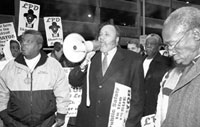
(FinalCall.com) – Activists in Louisville, Ky., have called for a boycott of businesses in the downtown area in protest of the December 5 fatal shooting by police detectives of James Taylor, 50, who was handcuffed at the time.
A similar boycott for similar reasons has impacted the economy of Cincinnati, Ohio, a city about 100 miles north of Louisville.
Activist have also written the U.S. Justice Department about the shooting and have held daily protests, bringing such activists as Dick Gregory, Martin Luther King III and Congressman John Conyers (D-Mich.) to Louisville.
In a letter dated Dec. 13 to the Justice Department, Rev. Louis Coleman, executive director of the Justice Resource Center, said that for the last decade activists in the city have filed numerous complaints with the federal agency concerning issues of police brutality and abuse. Rev. Coleman said the response from the Justice Department has been one of indifference.
The activist/minister said that in recent years seven Black men have been murdered by police officers under questionable circumstances. All of the fatal shootings have been ruled justifiable, he said.
“We are taking matters into our own hands this time,” Rev. Coleman told The Final Call. He said activists believe that the Louisville business community is the real power broker in Louisville, not the politicians.
“We are taking the fight for justice for James Taylor to the corporations that make money from us, but do not speak out concerning issues such as police brutality,” Rev. Coleman stressed. “This is the best time to get our point across; it’s the holidays,” he said.
Rev. Coleman said 30 percent of Louisville’s 200,000 citizens are Black.
According to police reports, James Taylor had been handcuffed while in his one-room apartment when Detective Michael O’Neal fired 12-rounds into his five feet, nine inch, 159-pound frame. Coroner Richard Greathouse told reporters that the seven bullets severed Mr. Taylor’s vital organs.
The coroner said the “circumstances surrounding the shooting were very troubling.” Mr. Greathouse told the Louisville Courier-Journal that this is the first time in his 29 years as a coroner that police shot a suspect who was already handcuffed.
Police Chief Greg Smith told reporters that four other men in the apartment with Mr. Taylor admitted to drinking and smoking crack cocaine. Police said they recovered a crack pipe, but no illegal drugs. Chief Smith said that Mr. Taylor had a box-cutter in his hands when he was shot.
Commonwealth Attorney Dave Stengel told the Courier-Journal that he expected this case would be brought to the grand jury after the police department’s investigation is completed. Federal authorities have also expressed interest in the case.
“The FBI has started an investigation into the recent shooting because of the handcuff factor,” Jeff Vessels, executive director of the American Civil Liberties Union office in Louisville, said during a Dec. 13 telephone interview. “We need justice in Louisville. The mood here is, here we go again, another police shooting swept under the rug. We have been fighting for the last 10 years to get the police department to change the way it does business.”
In his letter to the Justice Department, Rev. Coleman said recruiting and upgrading of Black officers has not changed in 30 years.
“As of this writing, not one of the six major command districts have an African American in a command position,” Rev. Coleman wrote, adding that 90 percent of the complaints to the Louisville Police Dept.’s Internal Affairs Division have been dismissed.
Activists say they have been arguing for a Police Civilian Review Board in Louisville. Mr. Vessels said the case for such a board was won two years ago, but has been held up in court because of a suit filed by the Fraternal Order of Police, which called the review board “unconstitutional.”
Yvonne Bach, editor of the Louisville Defender, a Black community newspaper, believes that getting the Police Review Board will help relieve some of the tension in Louisville.
“The Black community has lost faith in the police department and the political system of Louisville, so the board would be a step in the right direction,” Ms. Bach said.












